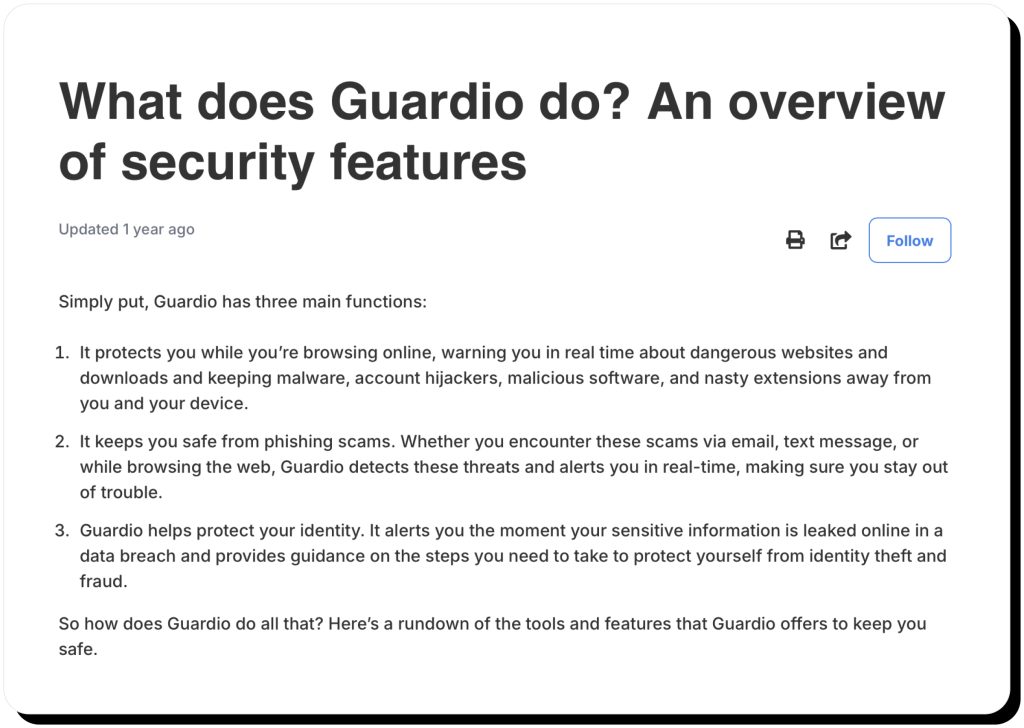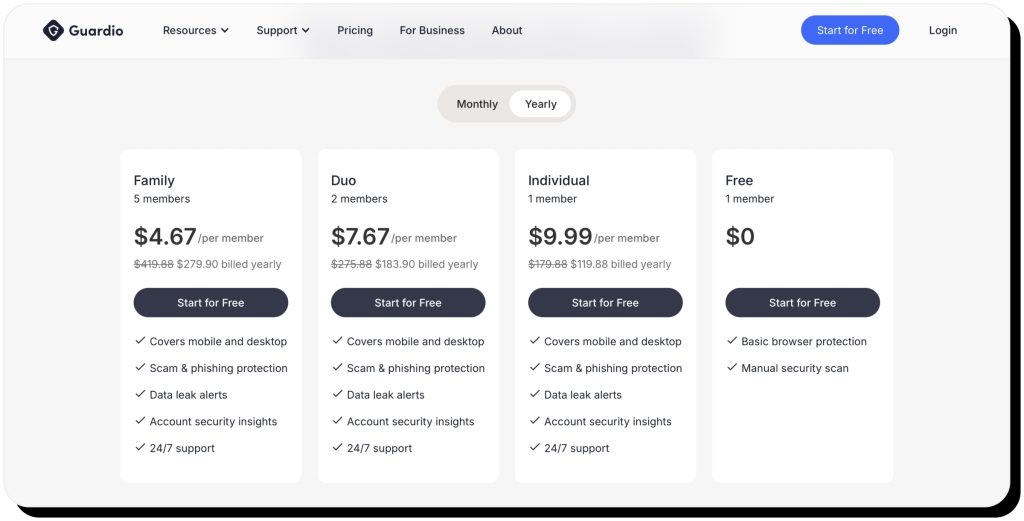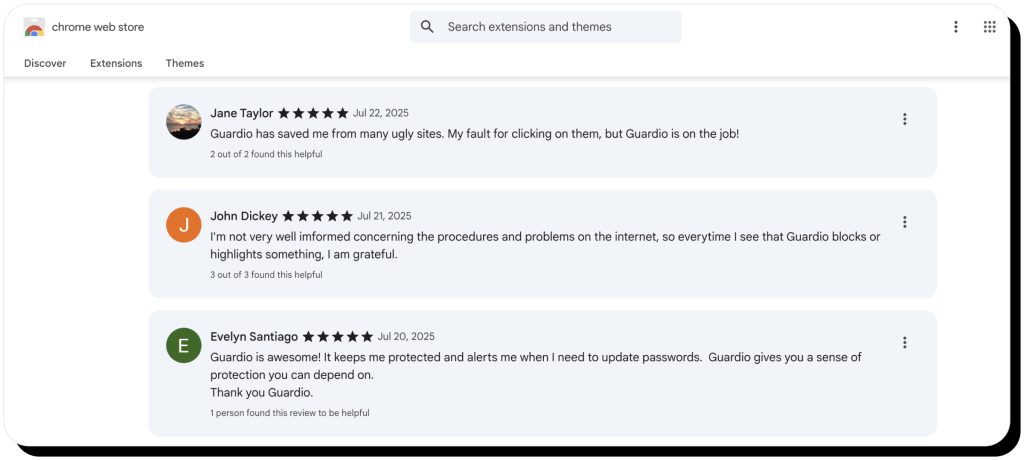Is Guardio legit? A 2025 review of the browser security extension

Guardio is a legitimate browser extension and mobile app trusted by more than 1.5 million users to protect against common online privacy and security threats. It’s operated by a recognized company and does not track your general browsing activity or sell user data to third parties.
However, though the service excels at detecting and neutralizing web-based threats, it’s not a complete antimalware solution. Here’s what Guardio does, what it doesn’t do, what it costs, and how it stacks up to other online security software.
What is Guardio?
Founded in 2018, Guardio is a browser extension and mobile app designed to improve your online security through a suite of features that block malicious websites and downloads, identify phishing and smishing scams, and monitor for identity theft and data breaches.
The browser extension is compatible with any device running Google Chrome or Microsoft Edge, while the mobile app is available for Android and iOS devices.
How does Guardio work?
The Guardio browser extension and mobile app monitor your online activity to protect you from real-time threats. The free plan scans every website you visit and blocks malicious websites that use phishing tactics to try to steal your money or identity. It also allows you to manually scan for threats from browser hijackers, harmful extensions, suspicious websites you’ve visited, and unwanted notifications (such as phishing pop-ups).
Premium plans extend protection with the following features:
- Identity protection: Add your email address and phone number to your monitoring list, and Guardio will monitor the Internet and the dark web for data breaches. If it finds your info exposed, it will instantly alert you and provide guidance for mitigating the breach.
- Download scanning: Guardio automatically scans downloads for malware and blocks threats before they can infect your devices.
- Email monitoring: Guardio monitors your Gmail account and instantly notifies you about suspicious and phishing emails. Note that you will need to connect your Gmail account to Guardio to use this feature.
- Malicious extension detection: Guardio detects and automatically turns off malicious browser extensions.
- Unwanted notification cleanup: Guardio detects and blocks malvertising, clickbait pop-ups, and fake system notifications.
- Blocked hijacking: Hijacking is when your browser settings are changed without your permission – often through malicious downloads or fake software updates. Hijackers then replace your default search with third-party results and can compromise your privacy and identity. Guardio detects and fixes these hijacking attempts.
- Scam text filtering (iOS only): The Guardio iOS app automatically filters smishing texts into a junk folder.
- Identity theft insurance: Paid Guardio plans include up to $1 million in identity theft insurance.
- 24/7 emergency hotline: Customer service can help not only with emergencies but also with account setup and other questions.

What can’t Guardio do?
While Guardio can help you stay safer online, it can’t protect against every type of threat to your devices.
It’s not an antivirus
Guardio is not a complete antivirus software. It doesn’t scan your computer or your mobile device to find or remove deep-rooted malware. Protection is limited to your browser, Gmail, and iOS text messages.
It’s not a VPN
Unlike VPNs – Virtual Private Networks – Guardio can’t anonymize your browsing, change your “location,” or mask your IP address. Your browsing data and location are still visible to your ISP (Internet Service Provider), websites, trackers, and potentially hackers. If you want to anonymize your browsing, consider using a VPN or a privacy-oriented browser like Tor.
It doesn’t resolve data breaches
Guardio can provide instant data breach alerts, but it doesn’t automatically remove breached data from the dark web or hacker forums. Thus, while Guardio can let you know if your information has been exposed, it can’t directly prevent identity fraud. You’ll need to take action to protect yourself once your data has been found exposed. Note that Guardio does offer guidance and has a 24/7 hotline if your identity is compromised.
It can’t stop every scam
Nothing is 100% foolproof when it comes to scam prevention, including Guardio. Criminals are always improving their tactics to trick humans and machines, so it’s always best to exercise caution and not simply rely on privacy and security apps when browsing the web.
How much is Guardio per month?
The free Guardio plan includes basic browser protection – fake website alerts in your browser – plus the ability to run manual security scans to detect suspicious sites you visit, malicious extensions, data breaches, hijackers, and harmful ecommerce pages. However, the free plan only reports potential risks; it does not fix them.
Paid Guardio plans all offer the full security suite, and pricing depends on the number of users in your plan:
- Individual (1 member): $14.99/mo. or $119.88/year (comes down to $9.99/mo./member)
- Duo (2 members): $22.99/mo. or $183.90/year (comes down to $7.67/mo./member)
- Family (5 members): $34.99/mo. or $279/year (comes down to $4.67/mo./member)
Guardio also has a VIP tier that reportedly costs $199.99 a year. VIP members and up to four family members get priority support with a dedicated one-on-one security expert.
Note that Guardio offers a seven-day free trial so you can test all its features before committing to payment.

Is Guardio safe to use?
Yes, Guardio is safe to use because:
- It’s a legitimate, registered company, not some shady plugin.
- It’s an established extension that’s been available on the Chrome Web Store and Microsoft Edge for years, which means it passed their strict security standards.
- Guardio does not share user data with marketers.
- It’s a lightweight extension that doesn’t noticeably slow down browser performance.
However, it is important to understand that Guardio requires certain permissions for full functionality. For example:
- Guardio reads the web pages you visit so it can detect malicious scripts, phishing attempts, fake URLs, and other threats.
- To monitor your email for phishing, Guardio requires permission to access your Gmail account – which allows it to read the content of your emails.
While there is no evidence that Guardio misuses these permissions – and the company states it only requests the bare minimum access needed to provide protection – strict privacy-minded users might not want to grant any permissions to the extension or app at all.
Is Guardio trustworthy?
Yes, Guardio is considered a trustworthy company, and both the browser extension and mobile app have mostly favorable reviews.
The extension has a 4.5-star rating out of over 1,300 reviews on Chrome Web Store, where more than 700,000 people have installed Guardio. On Edge Add-Ons, it has a 4-star rating from over 400,000 users.
On Google Play, the app has 4 stars from over 7,000 reviewers and more than 500,000 total downloads, while it nets a 4.7-star rating from over 6,000 reviews on the Apple App Store.
More than 8,400 people have reviewed Guardio on Trustpilot, where it has a 4.3-star rating, and PC Mag gives Guardio high marks for phishing protection and malware defense, though it notes that Guardio is not a full identity theft prevention solution.
In addition, Guardio states it does not sell or share your data with third parties, a critical factor when considering the trustworthiness of any privacy and security software.

As for specific feedback, Guardio users say it effectively blocks malicious sites and gives clear alerts. Overall, many mention that the extension/app gives them a peace of mind and makes browsing safer. At the same time, some users state that the number of alerts feels spammy and upselling can get quite annoying.
Overall, the number of positive reviews far exceeds the number of negative ones.

Alternatives to Guardio
Here’s how Guardio stacks up to popular alternatives.
Malwarebytes Browser Guard
Malwarebytes Browser Guard is completely free, offers strong ad blocking, neutralizes trackers, and gives alerts for malicious websites and data breaches. Unlike Guardio, it also works with Firefox and Safari browsers. Beyond that, features are limited unless you upgrade to the full Malwarebytes suite.
Avast Online Security
Avast Online Security is another free extension that blocks online trackers and detects malicious websites and phishing scams. It features a cookie manager that lets you auto-accept and decline cookies to avoid seeing those pop-ups. A privacy advisor helps secure social media accounts, while the ad opt-outs feature contacts advertisers to ask them to stop using your data. The software also works with multiple browsers – Chrome, Edge, Firefox, Opera, and Avast’s own browser. Avast is a well-established brand, and its extension has more features than Guardio, but it comes at the cost of being heavier on resources.
Bitdefender Traffic Light
A lightweight extension with strong phishing protection, Bitdefender’s free Traffic Light comes with a link scanner and malware filter that automatically blocks malicious websites. However, Traffic Light does not have the same identity protection or extension monitoring features of Guardio.
Traditional antivirus suites with web protection
Traditional antivirus software like Norton and McAfee offer web protection extensions to complement their full suite of antimalware features, which include file scanning, firewalls, VPNs, identity protection, password managers, and dark web monitoring. Antivirus software offers comprehensive protection, while Guardio focuses exclusively on web protection.
How Onerep complements your device protection
Guardio is a valuable tool to detect phishing webpages and make sure your browsing is safe. However, it misses a crucial threat to your privacy—data brokers.
Public data brokers, AKA people-search sites, publish your personal information online and make it easily available to anyone interested—often for free. The exposed data includes names, home addresses, contact details, properties, political affiliations, family ties, legal records, licenses, and much more. Such a rich variety of details makes people-search websites a treasure trove for scammers and ill-wishers, who use it to craft believable phishing and social engineering attacks, spam you, or even steal your identity.
Onerep protects your privacy by removing your private data from 232 people-search sites. The service scans the sites for your info, then sends opt-out requests to have the exposed records removed. After the initial removal, Onerep continues to monitor each site: if a data broker republishes your information, Onerep immediately repeats the process.
Conclusion: who is Guardio best for?
Guardio might be a good choice for non-technical users who just want an easy way to safely browse the web, reply to emails, and respond to texts without worrying about being scammed. It can also be a good choice for couples and families, since it offers discounted rates for multi-person plans. However, people who are already using a full-suite antivirus likely already have access to these features and do not need to purchase Guardio.
Guardio pros and cons
| Pros | Cons |
|---|---|
| Real-time protection from common online security risks: phishing, smishing, malicious websites and browser extensions Premium plans include identity theft insurance Free version available; 7-day free trial for premium plans Quick, simple setup | Doesn’t offer a full suite of security tools that scan devices for malware. Limited to browser and texts Text filtering is limited to iOS devices Not available for Safari or Firefox (only Chrome and Edge) Somewhat pricey compared to full antivirus software with web protection |
FAQs
What is Guardio and is it safe?
Guardio is a browser extension and mobile app that helps protect against many browser-based security risks, including malicious websites, phishing, data breaches, and identity theft. The mobile app adds scam text filtering for iOS. Guardio is considered safe; it’s trusted by major app stores and does not sell user data to third parties.
Is Guardio legitimate?
Yes, Guardio is a legitimate service operated by a recognized business. More than 1.5 million people use Guardio to protect against some of the most common online scams and security threats.
How much does Guardio cost?
Guardio pricing ranges from $14.99/month for one person to $34.99/month for up to five family members. Discounts are available for annual plans. Guardio also offers a free plan with limited features.
Is Guardio free?
Guardio offers a free plan with instant fake website alerts in your browser. It also allows you to run manual scans to detect malicious extensions, hijackers, and security breaches. However, the free plan does not fix security issues and you’ll need a paid plan to use all of Guardio’s features.
What’s included in the Guardio membership?
A Guardio membership includes real-time protection against malicious websites and browser extensions, data breach monitoring, text message filtering (with the mobile app), hijacker protection, download scanning, email monitoring, identity theft insurance, and a 24/7 hotline. Note that Guardio is not an antivirus and does not scan your devices for malware.





Mark comes from a strong background in the identity theft protection and consumer credit world, having spent 4 years at Experian, including working on FreeCreditReport and ProtectMyID. He is frequently featured on various media outlets, including MarketWatch, Yahoo News, WTVC, CBS News, and others.